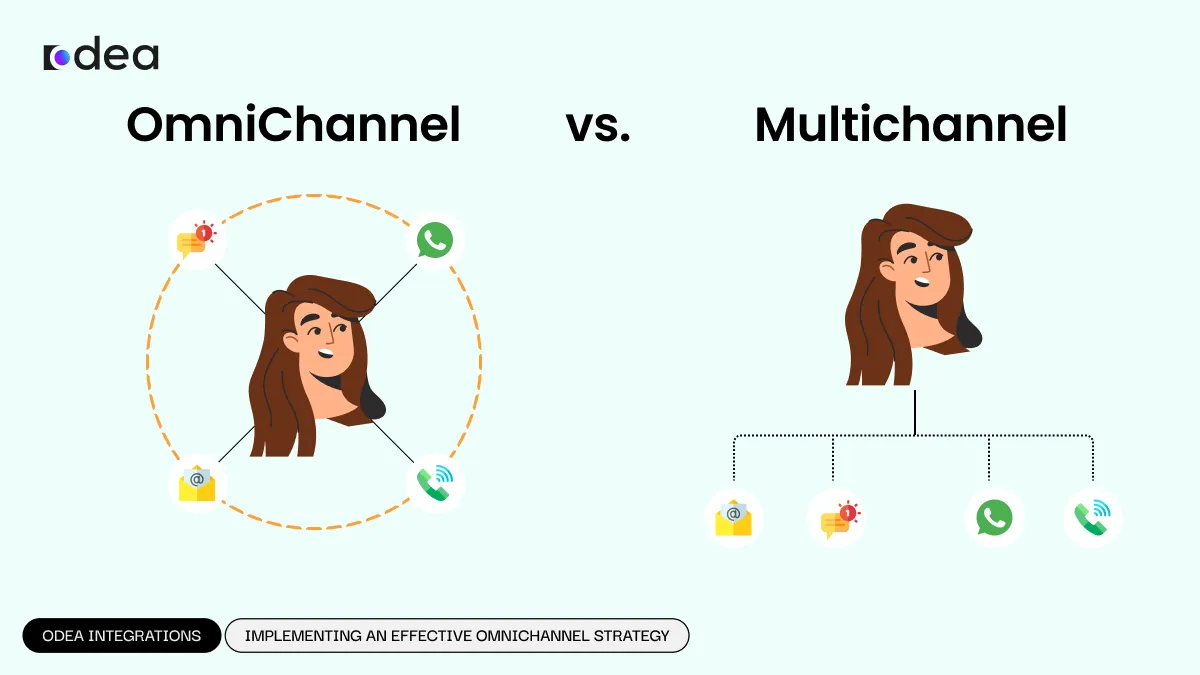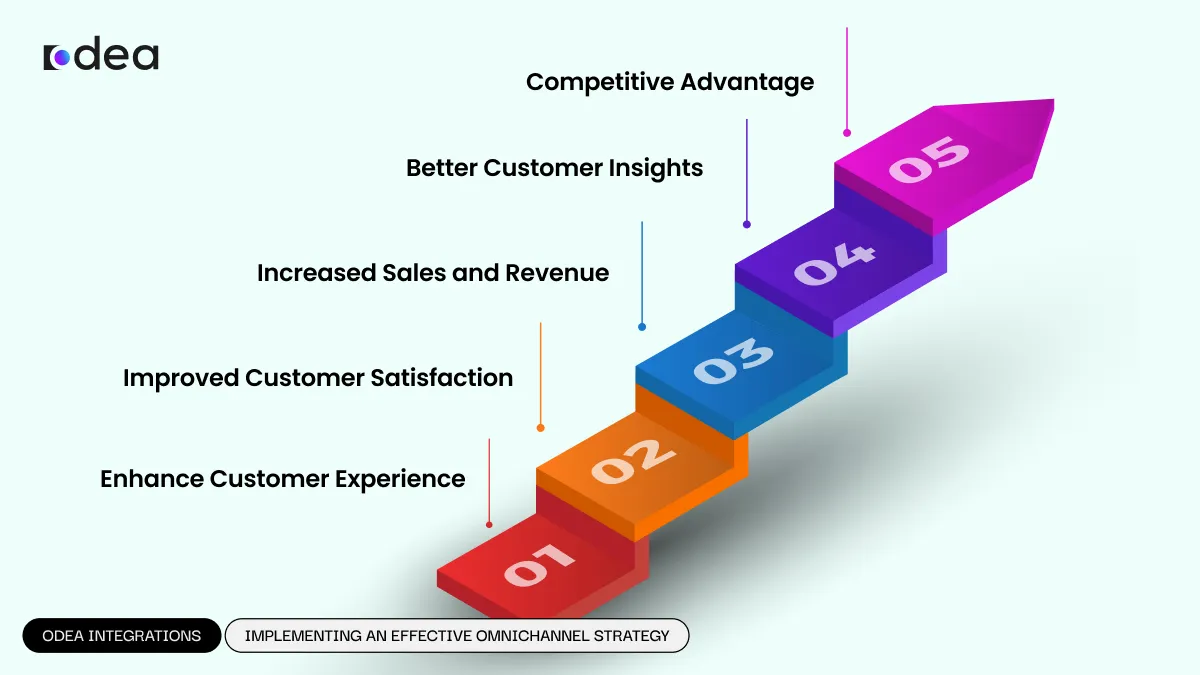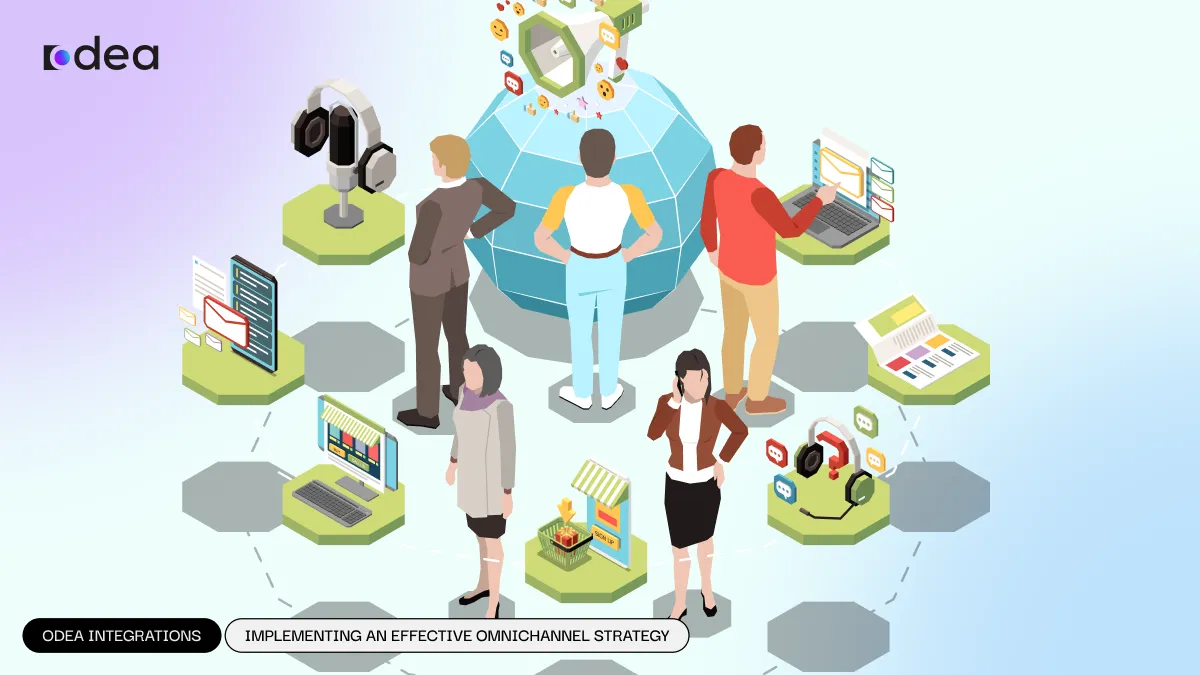In today’s fast-evolving business landscape, an omnichannel support strategy has become the cornerstone for companies seeking to deliver seamless, fully integrated customer experiences across every touchpoint. Customers no longer settle for fragmented interactions — they expect their journey to flow naturally whether they engage via chat, email, phone, social media, or even in-person visits.
For forward-thinking companies, especially those partnering with advanced CX platforms like Odea Integration, mastering an effective omnichannel customer journey strategy is not just a competitive advantage but a necessity.
This approach goes beyond simply making customers happy — it’s about crafting a cohesive and frictionless experience that anticipates and adapts to customer needs at every step.
When executed well, omnichannel strategy connects all communication channels into a single, smooth experience that delights customers and empowers teams to resolve issues quickly and personally.
In this article, we’ll explore what an omnichannel support strategy truly means, why it matters deeply in today’s market, and provide practical insights and steps to help you implement this approach successfully in your organization.
We aim to equip you with the tools and understanding needed to create a connected customer experience that drives loyalty and growth.
What is an Omnichannel Support Strategy?
Defining Omnichannel Support
At its core, an omnichannel support strategy is about delivering a consistent, unified experience to customers regardless of the channel they choose to use. This means that whether a customer reaches out by phone, live chat, email, social media, or a mobile app, the journey should feel as if it’s all part of one continuous conversation.
Unlike traditional multichannel support systems, where each channel operates as a separate silo with limited or no communication between them, omnichannel connects all channels into one integrated framework.
This integration allows customers to switch channels mid-journey without needing to repeat themselves or re-explain their issue — a feature that drastically improves satisfaction.
For more insights on building a seamless omnichannel experience, check out Building a Seamless Omnichannel Experience for Customers.
Omnichannel vs. Multichannel: Why the Distinction Matters
It’s easy to confuse omnichannel with multichannel, but the difference is significant and critical to understand. Multichannel support simply means providing customers with multiple channels to reach your business — phone, email, chat, social media, etc. — but these channels often function independently.
For example, if a customer sends a query on social media and later calls your support line, the agent answering the call may have no visibility into that prior interaction, forcing the customer to start over.
Omnichannel, on the other hand, ensures that all these channels are linked and share information seamlessly. This means the customer can initiate contact via Instagram, continue on a phone call, and resolve the issue through live chat, all without disruption or confusion.
This cohesive flow benefits not just the customer but also empowers support teams with a full picture, leading to quicker, more accurate resolutions.
Companies leveraging advanced cloud CX platforms, such as those expertly integrated by Odea Integration, find it significantly easier to build and maintain an effective omnichannel support strategy. These platforms centralize communication, streamline workflows, and enable the seamless experience customers demand.

Why It Matters: The Benefits of Omnichannel Customer Support
Adopting an omnichannel support strategy isn’t just a trend — it’s a transformative approach that delivers measurable benefits across the board.
- First and foremost, it vastly improves the customer experience. When customers aren’t forced to repeat information at every interaction, their journey feels smoother, more respectful, and personalized. This level of convenience and care boosts customer satisfaction substantially.
- Secondly, omnichannel support increases customer retention. When customers perceive consistency and reliability in how they are treated — regardless of whether they’re chatting online, calling support, or sending emails — they build a deeper trust and stronger loyalty to the brand. This loyalty translates directly into repeat business and positive word-of-mouth.
- Third, it enhances support team efficiency. With integrated customer histories available instantly, agents spend less time asking for context and more time solving problems. Faster resolutions reduce frustration for both parties and increase operational productivity. Learn more about how a unified agent desktop enhances this efficiency, Unified Agent Desktop: Features and Benefits.
- Fourth, it provides richer customer insights. When data from all channels flows into a unified platform, businesses gain a more comprehensive understanding of customer preferences, behaviors, and pain points. These insights empower proactive service improvements and targeted marketing.
- Finally, implementing omnichannel support creates a significant competitive advantage. In crowded markets, companies that can deliver consistent, frictionless experiences across all touchpoints differentiate themselves as leaders in customer care.
Odea Integration’s cloud CX solutions are designed to unlock these benefits fully. Their technology makes it simpler for businesses to unify communications, optimize customer journeys, and elevate the overall support experience, turning omnichannel from a nice-to-have feature into a strategic business imperative.

Use Cases and Industry Applications of Omnichannel Support
The value of an omnichannel strategy spans across many sectors, meeting industry-specific demands with precision:
- Retail: Shoppers expect real-time updates on product availability and a unified experience whether browsing online, using mobile apps, or visiting brick-and-mortar stores. Omnichannel support guarantees smooth transitions and personalized service every step of the way.
- Banking & Finance: Security and trust are paramount. Customers need effortless communication across apps, calls, and chat without repeating sensitive information. Omnichannel ensures secure, consistent interactions that build lasting loyalty.
- Healthcare: Patients benefit from coordinated messaging that spans appointment scheduling, telehealth visits, and follow-up care, leading to better treatment outcomes and patient satisfaction.
- Telecommunications: Technical issues can be complex and frustrating. Having a full interaction history readily available enables quicker troubleshooting and less customer frustration.
- Travel & Hospitality: Booking, cancellations, and inquiries require flawless handling on any channel. Omnichannel support ensures travelers receive timely, connected service that enhances their overall experience.
In every one of these fields, companies working with advanced CX platforms integrated by Odea Integration find that omnichannel strategies help unify communication channels, elevate service quality, and deepen customer relationships.
Key Components of an Effective Omnichannel Strategy
Building a truly seamless omnichannel experience requires a thoughtful combination of several critical elements:
- Unified Customer Data: The foundation is a single customer profile that aggregates every interaction from all channels — calls, emails, chats, social media messages — into one accessible record. This means agents have full context at their fingertips, eliminating the need for customers to repeat themselves.
- Integrated CX Platforms: Powerful cloud-based platforms bring all communication channels into one interface. Voice, chat, email, social media, and SMS are managed from a single workspace, enabling agents to respond faster and with more accuracy.
To explore leading software options that optimize contact center omnichannel support, see Top Omnichannel Software Solutions for Contact Centers. - Channel Consistency: The brand’s voice, tone, and messaging must stay uniform across channels. Customers expect the same quality and reliability whether they’re on Instagram, the website, or a phone call.
- Intelligent Routing and Automation: AI-powered tools, including chatbots and smart routing systems, direct inquiries to the right agent or department swiftly, reducing wait times and improving response quality.
- Real-Time Analytics: Supervisors and managers benefit from dashboards and reports that track agent performance, customer satisfaction, and emerging issues. This data fuels continuous improvement and smarter decision-making.
Odea Integration’s solutions excel at integrating these components in flexible, scalable ways that suit unique business needs. Their expertise helps companies not only implement omnichannel strategies effectively but also sustain them for long-term success.

Common Challenges and Misconceptions
While the benefits are clear, many organizations struggle with common hurdles:
- Siloed Systems: When communication channels and customer data remain isolated, it’s impossible to create a truly seamless experience. Fragmented systems lead to inconsistent service.
- Overcomplicated Technology: Complex, hard-to-use platforms frustrate agents and hinder productivity. Usability is critical to keep teams motivated and effective.
- Neglected Training: Even the best technology fails without proper training. Continuous education ensures agents remain confident and provide consistent service.
- Confusion Between Omnichannel and Multichannel: Many mistakenly treat omnichannel as merely having multiple channels. Without true integration, the experience falls short of customer expectations.
- Overreliance on Automation: Automation should enhance, not replace, the human touch. Customers still want empathy and personalized care from real people.
Odea Integration supports businesses in navigating these pitfalls with fully integrated, user-friendly CX platforms and comprehensive training programs. This hands-on approach helps companies build practical, sustainable omnichannel strategies that improve customer satisfaction and boost competitive advantage.
How Odea Integration Helps
Odea Integration specializes in delivering tailored omnichannel support solutions by seamlessly integrating top-tier cloud CX platforms. Their expertise ensures every customer touchpoint — whether voice calls, live chat, emails, or social media — flows into a unified platform that’s easy for agents to manage.
This integration empowers businesses to provide consistent, personalized service at every stage, fostering trust and loyalty essential for growth. Beyond technology, Odea offers dedicated support and strategic guidance to help companies avoid common implementation challenges and maximize the benefits of omnichannel support.
Choosing Odea Integration means partnering with a team that understands the complexities of omnichannel strategies and delivers scalable, flexible solutions that grow with your business. This partnership ensures a unified customer experience that stands out in competitive markets and consistently delights customers.
Conclusion
In today’s customer-centric landscape, an omnichannel support strategy is no longer a luxury but a fundamental requirement for businesses aiming to deliver exceptional experiences. Without integrating all communication channels and unifying customer data, companies risk fragmented, inconsistent service that drives customers away.
Ignoring the power of integrated cloud CX platforms or neglecting team training can slow progress and erode efficiency. Businesses that proactively adopt omnichannel strategies, supported by expert partners like Odea Integration, position themselves for sustained success and growth.
Don’t let your customer support fall behind or remain disjointed. Reach out to Odea Integration today and harness the full potential of seamless, personalized omnichannel support. Your customers deserve nothing less — and so does your business.